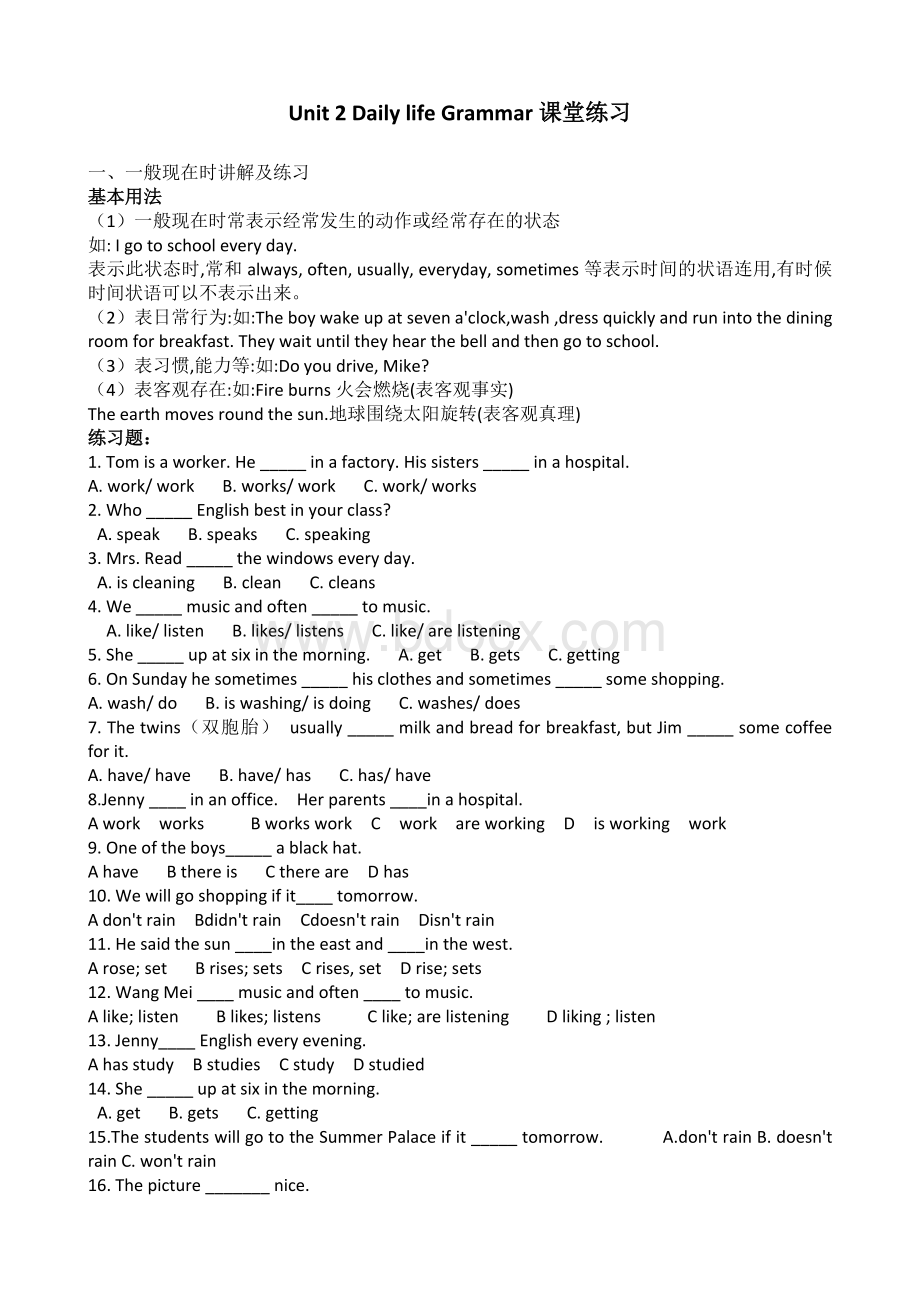初中英语七年级一般现在时、频度副词讲解及练习.doc
《初中英语七年级一般现在时、频度副词讲解及练习.doc》由会员分享,可在线阅读,更多相关《初中英语七年级一般现在时、频度副词讲解及练习.doc(4页珍藏版)》请在冰豆网上搜索。

Unit2DailylifeGrammar课堂练习
一、一般现在时讲解及练习
基本用法
(1)一般现在时常表示经常发生的动作或经常存在的状态
如:
Igotoschooleveryday.
表示此状态时,常和always,often,usually,everyday,sometimes等表示时间的状语连用,有时候时间状语可以不表示出来。
(2)表日常行为:
如:
Theboywakeupatsevena'clock,wash,dressquicklyandrunintothediningroomforbreakfast.Theywaituntiltheyhearthebellandthengotoschool.
(3)表习惯,能力等:
如:
Doyoudrive,Mike?
(4)表客观存在:
如:
Fireburns火会燃烧(表客观事实)
Theearthmovesroundthesun.地球围绕太阳旋转(表客观真理)
练习题:
1.Tomisaworker.He_____inafactory.Hissisters_____inahospital.
A.work/workB.works/workC.work/works
2.Who_____Englishbestinyourclass?
A.speakB.speaksC.speaking
3.Mrs.Read_____thewindowseveryday.
A.iscleaningB.cleanC.cleans
4.We_____musicandoften_____tomusic.
A.like/listenB.likes/listensC.like/arelistening
5.She_____upatsixinthemorning.A.getB.getsC.getting
6.OnSundayhesometimes_____hisclothesandsometimes_____someshopping.
A.wash/doB.iswashing/isdoingC.washes/does
7.Thetwins(双胞胎)usually_____milkandbreadforbreakfast,butJim_____somecoffeeforit.
A.have/haveB.have/hasC.has/have
8.Jenny____inanoffice.Herparents____inahospital.
AworkworksBworksworkCworkareworkingDisworkingwork
9.Oneoftheboys_____ablackhat.
AhaveBthereisCthereareDhas
10.Wewillgoshoppingifit____tomorrow.
Adon'trainBdidn'trainCdoesn'trainDisn'train
11.Hesaidthesun____intheeastand____inthewest.
Arose;setBrises;setsCrises,setDrise;sets
12.WangMei____musicandoften____tomusic.
Alike;listenBlikes;listensClike;arelisteningDliking;listen
13.Jenny____Englisheveryevening.
AhasstudyBstudiesCstudyDstudied
14.She_____upatsixinthemorning.
A.getB.getsC.getting
15.ThestudentswillgototheSummerPalaceifit_____tomorrow.A.don'trainB.doesn'trainC.won'train
16.Thepicture_______nice.
A.looksB.islookedC.lookD.islooking
17.Don'tsmokeuntiltheplane______off.
A.takesB.tookC.wastakenD.istake
18.Johnisalways______others.
A.helpB.helpingC.helpsD.tohelp
19.You'dbetter______athomeand______yourhomework.
A.tostay,doB.stay,doC.tostay,todoD.stay,todo
20.UncleWangknows_______awashingmachine.
A.howtomakeB.tomakeC.howmakingD.whattomake
21.Myfatheralways__________(come)backfromworkverylate.
22.Theteacherisbusy.He__________(sleep)sixhoursaday.
23.Listen!
Joan__________(sing)intheclassroom.Sheoften__________(sing)there.
24.__________yourbrother__________(know)Japanese?
25.Where__________you__________(have)luncheveryday?
26.Thegirl__________(like)wearingaskirt.Look!
She__________(wear)aredskirttoday.
二、频度副词、短语用法及练习
一般现在时常常与always,usually,often,sometimes,seldom,hardly,never等频度副词连用,表示动作发生的频率。
这些频度副词按发生频率的高低依次为:
always→usually→often→sometimes→seldom→hardly→never。
频度副词在句中的位置比较灵活,但通常放在行为动词之前,系动词、情态动词或助动词之后。
1.always意为“总是,一直”,这是频率最高的词,表示动作反复,状态持续,不间断。
其反义词是never,意为“从不”。
如果要变为否定句,应将always改为never才能全部否定。
另外,当always与进行时态连用时,常表示“总是”,带有厌烦、不满或赞美等感情色彩。
如:
LiPingisalwayslateforschool.李平上学总是迟到。
LiPingisneverlateforschool.李平上学从不迟到。
(全部否定)
LiPingisnotalwayslateforschool.
李平上学不总是迟到。
(部分否定)
Theboyisalwaysaskingformoney.这个小男孩总是要钱。
(表厌烦)
2.usually意为“通常”,表示习惯性动作或状态,很少例外。
如:
Weusuallygotoschoolatseveninthemorning.
我们通常在早上七点上学。
MymotherandIusuallygoshoppingonSundays.
我和妈妈通常在星期天去买东西。
3.often意为“经常,时常”,表示反复性的动作或状态,中间有间断。
其反义词是seldom,意为“很少,不常”。
often在句尾时常被very或quite修饰。
如:
Theboysofteneatnoodlesandthegirlssometimeseatthem.
男生经常吃面条,女生有时吃。
Ioftenchatwithmyfriendsunderthebigtree.
我经常在这棵大树下和朋友聊天。
Hewritestohisfriendsquiteoften.他常给他的朋友写信。
4.sometimes意为“有时”,表示动作偶尔发生,间隔较长。
其位置比较灵活,放在句首、句中、句末都可。
如:
Sometimeswegotothecinemaandatothertimeswegoforawalk.
有时我们去看电影,有时我们去散步。
IsometimeswatchTVintheevening.我有时晚上看电视。
Myfatherhaslunchinthefactorysometimes.
我父亲有时在工厂吃午饭。
5.seldom意为“很少,不常”,表示否定意义。
如:
Thelittlegirlseldomgoesout.这个小女孩很少外出。
Heseldomgiveshiswifeapresent,doeshe?
他不常给妻子送礼物,是吗?
6.hardly具有否定意义,表示“几乎不、简直不”,除非特殊情况,否则不会发生。
如:
Theboyissoyoungthathecouldhardlyunderstandit.
这个孩子太小了,不可能懂得这件事。
7.never意为“从来不,从来没有”,也表示否定意义,它表示从未发生的动作或情况,没有例外。
如:
Theboysnevereatchocolateandthegirlsseldomeatit.
男生从不吃巧克力,女生很少吃。
*另外,onceayear(每年一次),twiceaweek(每周两次),threetimesaday(一天三次),everySaturdayafternoon(每星期六下午)等,这些时间状语也表示频率,它们可以和频度副词用在同一个句子中,表达上没有重复。
如:
Weusuallygotothecinemafourtimesamonth.
对这些频度副词或短语进行提问,都用疑问词howoften,表示“每(隔)多长时间做一次”的意思。
如:
练习题
1.—Ho